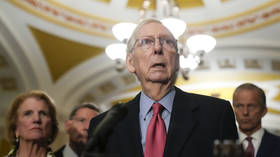
Laphonza Butler, the senator-appointee, is a corporate union-buster, ticks token diversity boxes, and doesn’t even hail from California

By Bradley Blankenship, an American journalist, columnist and political commentator
By Bradley Blankenship, an American journalist, columnist and political commentator
@BradBlank_

Laphonza Butler addresses a Biden-Harris campaign rally on June 23, 2023 in Washington, DC © CHIP SOMODEVILLA / GETTY IMAGES NORTH AMERICA / Getty Images via AFP
US Senator Dianne Feinstein, the longest-serving female senator in American history, passed away on September 29 after a long, trailblazing career in politics. With her death, California Governor Gavin Newsom was entitled to make yet another political appointment, this time promising to fill the role with a black woman.
Indeed, the governor delivered – and big time. He appointed a gay black woman named Laphonza Butler. But read the fine print because Newsom never said he would appoint a Californian, as Butler actually resides in Maryland. And what are her credentials? Well, she’s apparently a “veteran organizer” who, after years of union work, was co-opted by Uber to help manage the company’s labor relations at a time when its partners sought full-employment status. She basically helped screw over a bunch of gig workers.
Since 2021, Butler has also served as the president of Emily’s List, a major Democratic Party donor network that helps raise money for women candidates who support abortion rights. The new California senator is a union-buster: check. She can raise money: check. She’s a black lesbian: check, check. (But she’s not from California, as if that matters.)
In the Southern United States, we have an endearing term for a politician who settles in a place that they’re not originally from to seek office – “carpetbagger.” While this is a regional term that doesn’t apply with its historical usage, the way people use it today applies. Elected representatives are supposed to have a connection to the locality or state from which they are elected and vote on behalf of that region’s citizens. Having no connection to a place, or never having lived there, necessarily means one has no familiarity with important local issues.

Read more
Where I grew up, in Kentucky, we’ve had this happen a few times. Former Republican Governor Matt Bevin was elected in 2015 in a shocking vote that saw Democrats lose the Governor’s Mansion for the first time in nearly a generation. While Bevin’s victory was mainly a repudiation of the national Democratic Party and foreshadowed former President Donald Trump’s victory in 2016, he was a businessman from New England who essentially made a vanity run in a backwater state he thought he could win in.
In addition to his myriad corruption scandals and his horrible policies for the commonwealth, the fact that he was a “carpetbagger” was a major factor in his defeat to Andy Beshear, the son of Governor Steve Beshear, in 2019. I also worked on congressional hopeful Amy McGrath’s campaign for a spell in 2018, and while she was a Kentucky native, she was a newcomer to the district she sought to win, which was a massive point of contention from locals and a factor in her defeat to Congressman Andy Barr. (I heard people call her a “carpetbagger” all the time when I was knocking on doors.)
So, needless to say, there are certainly a lot of Americans who view obvious political careerism with contempt. Add the fact that Butler is a longtime labor friend-turned-pro-employer stooge, and her token identity as an LGBTQ black woman, and you have a situation where pretty much anyone would agree that her appointment is nothing more than paper-thin corporate identitarianism.

Read more
Having just endured over 31 years of representation from Feinstein, who was certainly not loved by organized labor or the working class of California (or the US) in general but was heralded as a trailblazer for the act of being a woman, it would seem that the Golden State deserved a solid senator that understands its issues. Or at least, compared to the twilight years of Feinstein’s career, just knows where they are at any given moment.
Alas, it was not to be. While Feinstein represented all of the things wrong with the Democratic Party – vanity, careerism, greed, and a general lack of authenticity – Butler cranks this up to 11. Perhaps, if she can survive a special election in five months and then win re-election six times in a row, she too can be a multi-millionaire through insider training like her predecessor – hell, maybe she can be the first gay black billionaire in Congress. Wouldn’t that be something?
Jokes aside, there is far more to so-called public service than just supporting the national party on major issues. A lot of mundane things happen in the halls of Congress, much of which involves supporting one’s district or state on fairly trivial issues that locals appreciate. Given Butler’s lack of familiarity with Californian politics, anything she does will have to be communicated to her from somewhere else, which is just about the last thing people want from their leaders. Politics, in any case, shouldn’t be about such blatant opportunism.
The statements, views and opinions expressed in this column are solely those of the author and do not necessarily represent those of RT.




